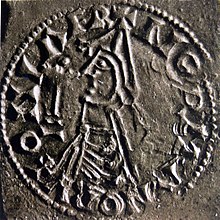Olaf II of Norway
| Olaf II | |||||||||
|---|---|---|---|---|---|---|---|---|---|

Coin of Olaf dated 1023–28.
|
|||||||||
| King of Norway | |||||||||
| Reign | 1015 – 1028 | ||||||||
| Predecessor | Sweyn Forkbeard | ||||||||
| Successor | Cnut the Great | ||||||||
| Born | 995 Ringerike, Norway |
||||||||
| Died | 29 July 1030 (aged 34–35) Stiklestad, Norway |
||||||||
| Spouse | Astrid Olofsdotter | ||||||||
| Issue |
Magnus, King of Norway Wulfhild, Duchess of Saxony |
||||||||
|
|||||||||
| House | St. Olaf | ||||||||
| Father | Harald Grenske | ||||||||
| Mother | Åsta Gudbrandsdatter | ||||||||
| Religion | Chalcedonian Christianity | ||||||||
| Full name | |
|---|---|
| Olaf Haraldsson | |
| Regnal name | |
| Ólafr digri |
Olaf II Haraldsson (995 – 29 July 1030), later known as St. Olaf (and traditionally as St. Olav), was King of Norway from 1015 to 1028. He was posthumously given the title Rex Perpetuus Norvegiae (English: Eternal/Perpetual King of Norway) and canonised in Nidaros (Trondheim) by Bishop Grimkell, one year after his death in the Battle of Stiklestad on 29 July 1030. His remains were enshrined in Nidaros Cathedral, built over his burial site.
Olaf's local canonisation was in 1164 confirmed by Pope Alexander III, making him a universally recognised saint of the Roman Catholic Church, and a commemorated historical figure among some members of the Anglican Communion. He is also a canonised saint of the Eastern Orthodox Church (feast day celebrated July 29 (translation August 3)) and one of the last famous Western saints before the Great Schism. The exact position of Saint Olaf's grave in Nidaros has been unknown since 1568, due to the Lutheran iconoclasm in 1536–37. Saint Olaf is symbolised by the axe in Norway's coat of arms, and the Olsok (29 July) is still his day of celebration. Many Christian institutions with Scandinavian links and Norway's Order of St. Olav, are named after him.
Modern historians generally agree that Olaf was inclined to violence and brutality, and they accuse earlier scholars of neglecting this side of Olaf's character. Especially during the period of Romantic Nationalism, Olaf was a symbol of national independence and pride, presented to suit contemporary attitudes.
...
Wikipedia
